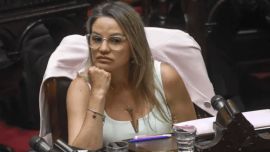Argentina's government may issue new peso bonds maturing in 2026 to public sector creditors in a bid to swap four trillion pesos (US$19.7 billion) of debt maturing in the second half of this year, according to a senior government official.
Economy Ministry officials want to sell new bonds maturing in 2026 and 2027, lengthening the sovereign debt maturity curve as a way of sending a signal to the private sector to also extend their maturities. Private investors hold 2.8 trillion pesos in local debt maturing in the second half of the year.
Public sector holdings account for 60 percent of the debt maturing in the second half of 2023.
The new bonds would either be inflation-linked or a dual bond, similar to the instruments issued at the last auction on March 9. A dual bond is an instrument in which investors receive the higher rate between two options at maturity, in this case either inflation or the exchange rate.
A spokesman for the Economy Ministry declined to comment for this article.
Argentina has a mountain of US$174 billion of local debt to manage, with the largest amounts concentrated in the months leading up to the October presidential election. This debt is growing almost exponentially because many of its obligations are linked to inflation that exceeds 100 percent.
In a local debt swap earlier this month, the Treasury exchanged a total of 4.34 trillion pesos for new 2024 and 2025 bonds, calming immediate concerns of a possible default on local debt. However, the country still faces maturities with the private sector of 600 billion pesos in March and around 1 trillion pesos a month between April and June.
To swap local debt for bonds maturing in 2026, the economy ministry could issue a decree obliging public institutions to swap their holdings during the second half of this year. This would allow a better matching of interest rates with bondholders, he said. In general, public sector holders are expected to participate in debt rollovers, as the steering functions are controlled by the Presidency.
by Ignacio Olivera Doll, Bloomberg



















Comments